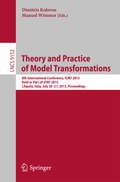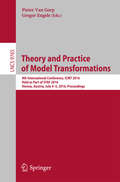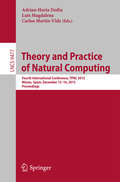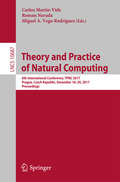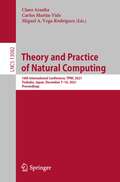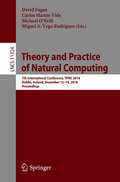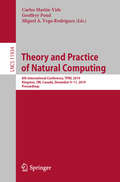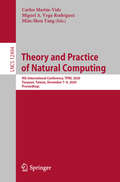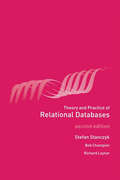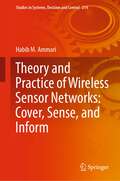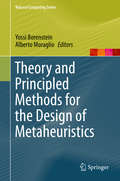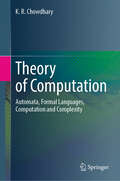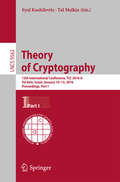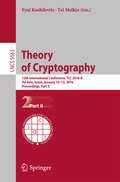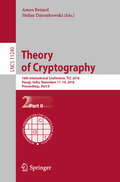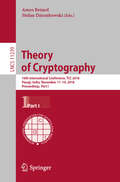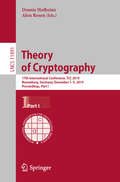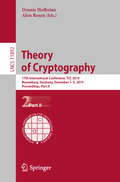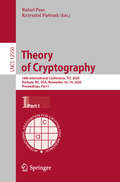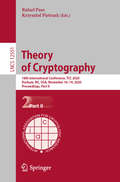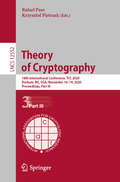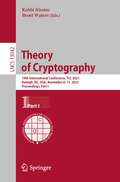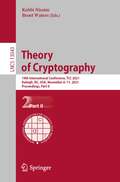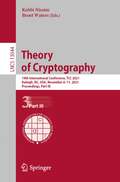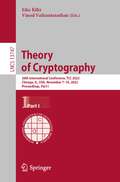- Table View
- List View
Theory and Practice of Model Transformations
by Dimitris Kolovos Manuel WimmerThis book constitutes the refereed proceedings of the 8th International Conference on Model Transformation, ICMT 2015, held in L'Aquila, Italy, in July 2015, as Part of STAF 2015, the federation of a number of the leading conferences on software technologies. The 16 revised papers were carefully selected from 34 submissions. The papers are organized in topical sections on change management; reuse and industrial applications; new paradigms for model transformation; transformation validation and verification; and foundations of model transformation.
Theory and Practice of Model Transformations
by Pieter Van Gorp Gregor EngelsThis book constitutes the refereed proceedings of the 9th International Conference on Model Transformation, ICMT 2016, held in Vienna, Austria, in July 2016, as Part of STAF 2015, the federation of a number of the leading conferences on software technologies. The 13 revised papers were carefully selected from 36 submissions. The papers are organized in topical sections on model transformation languages, model transformation tools, developing model transformations, applications of model transformations, and looking ahead.
Theory and Practice of Natural Computing
by Carlos Martín-Vide Adrian-Horia Dediu Luis MagdalenaThis book constitutes the refereed proceedings of the 4thInternational Conference on Theory and Practice of Natural Computing, TPNC2015, held in Mieres, Spain, in December 2015. The 12 revised full papers presented togetherwith 20 invited talks in this book were carefully reviewed and selected from 30submissions. The scope of TPNC is rather broad, containing topics of eithertheoretical, experimental or applied interest such as soft computing, computingarchitectures, and formal models.
Theory and Practice of Natural Computing
by Carlos Martín-Vide Miguel A. Vega-Rodríguez Roman NerudaThis book constitutes the refereed proceedings of the 6th International Conference,on Theory and Practice of Natural Computing, TPNC 2017, held in Prague, Czech Republic, December 2017.The 22 full papers presented in this book, together with one invited talk, werecarefully reviewed and selected from 39 submissions. The papers are organized around the following topical sections: applications of natural computing; evolutionary computation; fuzzy logic; Molecular computation; neural networks; quantum computing.
Theory and Practice of Natural Computing: 10th International Conference, TPNC 2021, Virtual Event, December 7–10, 2021, Proceedings (Lecture Notes in Computer Science #13082)
by Carlos Martín-Vide Miguel A. Vega-Rodríguez Claus AranhaThis book constitutes the refereed proceedings of the 10th International Conference on Theory and Practice of Natural Computing, TPNC 2021, held virtually, in December 2021. The 9 full papers presented together with 3 invited talks, in this book were carefully reviewed and selected from 14 submissions. The papers are organized in topical sections named Applications of Natural Computing, Deep Learning and Transfer Learning, Evolutionary and Swarm Algorithms.
Theory and Practice of Natural Computing: 7th International Conference, TPNC 2018, Dublin, Ireland, December 12–14, 2018, Proceedings (Lecture Notes in Computer Science #11324)
by Michael O'Neill Carlos Martín-Vide Miguel A. Vega-Rodríguez David FaganThis book constitutes the refereed proceedings of the 7th International Conference on Theory and Practice of Natural Computing, TPNC 2017, held in Dublin, Ireland, in December 2018. The 35 full papers presented in this book, together with one invited talk, were carefully reviewed and selected from 69 submissions. The papers are organized around the following topical sections: applications of natural computing as algorithms, bioinformatics, control, cryptography, design, economics. The more theoretical contributions handle with artificial chemistry, artificial immune systems, artificial life, cellular automata, cognitive computing, cognitive engineering, cognitive robotics, collective behaviour, complex systems, computational intelligence, computational social science, computing with words, developmental systems, DNA computing, DNA nanotechnology, evolutionary algorithms, evolutionary computing, evolutionary game theory, fractal geometry, fuzzy control, fuzzy logic, fuzzy sets, fuzzy systems, genetic algorithms, genetic programming, granular computing, heuristics, intelligent agents, intelligent systems, machine intelligence, molecular programming, neural computing, neural networks, quantum communication, quantum computing, rough sets, self-assembly.
Theory and Practice of Natural Computing: 8th International Conference, TPNC 2019, Kingston, ON, Canada, December 9–11, 2019, Proceedings (Lecture Notes in Computer Science #11934)
by Carlos Martín-Vide Miguel A. Vega-Rodríguez Geoffrey PondThis book constitutes the refereed proceedings of the 8th International Conference on Theory and Practice of Natural Computing, TPNC 2019, held in Kingston, ON, Canada, in December 2019. The 15 full papers presented in this book, together with two invited talk, were carefully reviewed and selected from 38 submissions. The papers are organized in topical sections named: Applications of Natural Computing; Evolutionary Computation; Genetic Algorithms, Swarm Intelligence, and Heuristics; Quantum Computing and Information.
Theory and Practice of Natural Computing: 9th International Conference, TPNC 2020, Taoyuan, Taiwan, December 7–9, 2020, Proceedings (Lecture Notes in Computer Science #12494)
by Carlos Martín-Vide Miguel A. Vega-Rodríguez Miin-Shen YangThis book constitutes the refereed proceedings of the 9th International Conference on Theory and Practice of Natural Computing, TPNC 2020, held in Taoyuan, Taiwan, in December 2020. The 12 full papers presented in this book, together with one invited talk, were carefully reviewed and selected from 24 submissions. The papers are organized in topical sections named: applications of natural computing; quantum computing and unconventional computing; and swarm intelligence, evolutionary algorithms, and DNA computing.
Theory and Practice of Relational Databases
by Bob Champion Stefan Stanczyk Richard LeytonThe study of relationship databases is a core component of virtually every undergraduate computer science degree course. This new edition of Theory and Practice of Relationship Databases retains all the features that made the previous edition such as success, and goes on to give even more comprehensive and informative coverage.Written in a tutorial style and containing a great many examples and exercises as well as extensively using illustrative and explanatory graphics, the author has produced an undergraduate textbook of great depth and clarity that is very easy to follow. The subject of relational databases is brought to life by the writing style and the inclusion of an homogenous case study that reinforces the issues dealt with in each chapter.The primary objective of the book is to present a comprehensive explanation of the process of development of database application systems within the framework of a set processing paradigm. Since the majority of these applications are built as relationship systems, a complete though reasonably concise account of that model is presented. Dr. Stanczyk has achieved this by concentrating on the issues that contribute significantly to the application development while de-emphasizing purely theoretical aspects of the subject. This has led to an imaginative and highly practical textbook that will be an excellent read for the undergraduate computer science student.
Theory and Practice of Wireless Sensor Networks: Cover, Sense, and Inform (Studies in Systems, Decision and Control #214)
by Habib M. AmmariThis book aims at developing a reader’s thorough understanding of the challenges and opportunities of two categories of networks, namely k-covered wireless sensor networks and k-barrier covered wireless sensor networks. It presents a variety of theoretical studies based on percolation theory, convexity theory, and applied computational geometry, as well as the algorithms and protocols that are essential to their design, analysis, and development. Particularly, this book focuses on the cover, sense, and inform (CSI) paradigm with a goal to build a unified framework, where connected k-coverage (or k-barrier coverage), sensor scheduling, and geographic data forwarding, gathering, and delivery are jointly considered. It provides the interested reader with a fine study of the above networks, which can be covered in introductory and advanced courses on wireless sensor networks. This book is useful to senior undergraduate and graduate students in computer science, computer engineering, electrical engineering, information science, information technology, mathematics, and any related discipline. Also, it is of interest to computer scientists, researchers, and practitioners in academia and industry with interest in these two networks from their deployment until data gathering and delivery.
Theory and Principled Methods for the Design of Metaheuristics
by Yossi Borenstein Alberto MoraglioMetaheuristics, and evolutionary algorithms in particular, are known to provide efficient, adaptable solutions for many real-world problems, but the often informal way in which they are defined and applied has led to misconceptions, and even successful applications are sometimes the outcome of trial and error. Ideally, theoretical studies should explain when and why metaheuristics work, but the challenge is huge: mathematical analysis requires significant effort even for simple scenarios and real-life problems are usually quite complex. In this book the editors establish a bridge between theory and practice, presenting principled methods that incorporate problem knowledge in evolutionary algorithms and other metaheuristics. The book consists of 11 chapters dealing with the following topics: theoretical results that show what is not possible, an assessment of unsuccessful lines of empirical research; methods for rigorously defining the appropriate scope of problems while acknowledging the compromise between the class of problems to which a search algorithm is applied and its overall expected performance; the top-down principled design of search algorithms, in particular showing that it is possible to design algorithms that are provably good for some rigorously defined classes; and, finally, principled practice, that is reasoned and systematic approaches to setting up experiments, metaheuristic adaptation to specific problems, and setting parameters. With contributions by some of the leading researchers in this domain, this book will be of significant value to scientists, practitioners, and graduate students in the areas of evolutionary computing, metaheuristics, and computational intelligence.
Theory of Computation: Automata, Formal Languages, Computation and Complexity
by K.R. ChowdharyThis book offers a fresh perspective on the study and teaching of the Theory of Computation. The author's selection of topics and the comprehensive set of questions demonstrate extensive knowledge and years of experience in both teaching and research. It addresses practical aspects of computing models that are often overlooked. The book's emphasis on pedagogy, through carefully crafted exercises and clear elucidation of learning outcomes and chapter summaries, is a refreshing approach to the subject. With the right platform, this book has the potential to be adopted as a textbook in universities worldwide. The book covers new developments not typically addressed in other texts on the subject, such as algebraic theory, new applications of finite automata and regular languages, and topics from compiler theory that are closely related. It also explores several new relationships among models, with a natural progression of chapters. Key strengths of this book include its coverage of contemporary and relevant topics, practical applications of theoretical concepts, an extended Chomsky Hierarchy, and discussions on decidability, undecidability, and unsolvability. The book is tailored for its intended audience, with selected chapters suitable for undergraduate B.Tech./B.E. computer science students. Additionally, Chapters 9–14 can be used for a course on "Advanced Topics in Theory of Computer Science" at the Master's level (M.E./M.Tech.). It also serves as a foundational resource for those engaged in research in computer science.
Theory of Cryptography
by Tal Malkin Eyal KushilevitzThe two-volume set LNCS 9562 and LNCS 9563 constitutes the refereed proceedings of the 13th International Conference on Theory of Cryptography, TCC 2016, held in Tel Aviv, Israel, in January 2016. The 45 revised full papers presented were carefully reviewed and selected from 112 submissions. The papers are organized in topical sections on obfuscation, differential privacy, LWR and LPN, public key encryption, signatures, and VRF, complexity of cryptographic primitives, multiparty computation, zero knowledge and PCP, oblivious RAM, ABE and IBE, and codes and interactive proofs. The volume also includes an invited talk on cryptographic assumptions.
Theory of Cryptography
by Tal Malkin Eyal KushilevitzThe two-volume set LNCS 9562 and LNCS 9563 constitutes the refereed proceedings of the 13th International Conference on Theory of Cryptography, TCC 2016, held in Tel Aviv, Israel, in January 2016. The 45 revised full papers presented were carefully reviewed and selected from 112 submissions. The papers are organized in topical sections on obfuscation, differential privacy, LWR and LPN, public key encryption, signatures, and VRF, complexity of cryptographic primitives, multiparty computation, zero knowledge and PCP, oblivious RAM, ABE and IBE, and codes and interactive proofs. The volume also includes an invited talk on cryptographic assumptions.
Theory of Cryptography: 16th International Conference, TCC 2018, Panaji, India, November 11–14, 2018, Proceedings, Part II (Lecture Notes in Computer Science #11240)
by Amos Beimel Stefan DziembowskiThe two-volume set of LNCS 11239 and LNCS 11240 constitutes the revised proceedings of the 16th International Conference on Theory of Cryptography, TCC 2018, held in Panaji, India, in November 2018.The total of 50 revised full papers presented in the proceedings were carefully reviewed and selected from 168 submissions. The Theory of Cryptography Conference deals with the paradigms, approaches, and techniques used to conceptualize natural cryptographic problems and provide algorithmic solutions to them and much more.
Theory of Cryptography: 16th International Conference, Tcc 2018, Panaji, India, November 11-14, 2018, Proceedings, Part Ii (Lecture Notes in Computer Science #11240)
by Amos Beimel Stefan DziembowskiThe two-volume set of LNCS 11239 and LNCS 11240 constitutes the revised proceedings of the 16th International Conference on Theory of Cryptography, TCC 2018, held in Panaji, India, in November 2018.The total of 50 revised full papers presented in the proceedings were carefully reviewed and selected from 168 submissions. The Theory of Cryptography Conference deals with the paradigms, approaches, and techniques used to conceptualize natural cryptographic problems and provide algorithmic solutions to them and much more.
Theory of Cryptography: 17th International Conference, TCC 2019, Nuremberg, Germany, December 1–5, 2019, Proceedings, Part I (Lecture Notes in Computer Science #11891)
by Dennis Hofheinz Alon RosenThe two-volume set LNCS 11891 and 11892 constitutes the proceedings of the 17th International Conference on Theory of Cryptography, TCC 2019, held in Nuremberg, Germany, in December 2019.The 43 full papers presented were carefully reviewed and selected from 147 submissions. The Theory of Cryptography Conference deals with the paradigms, approaches, and techniques used to conceptualize natural cryptographic problems and provide algorithmic solutions to them and much more.
Theory of Cryptography: 17th International Conference, TCC 2019, Nuremberg, Germany, December 1–5, 2019, Proceedings, Part II (Lecture Notes in Computer Science #11892)
by Dennis Hofheinz Alon RosenThe two-volume set LNCS 11891 and 11892 constitutes the proceedings of the 17th International Conference on Theory of Cryptography, TCC 2019, held in Nuremberg, Germany, in December 2019.The 43 full papers presented were carefully reviewed and selected from 147 submissions. The Theory of Cryptography Conference deals with the paradigms, approaches, and techniques used to conceptualize natural cryptographic problems and provide algorithmic solutions to them and much more.
Theory of Cryptography: 18th International Conference, TCC 2020, Durham, NC, USA, November 16–19, 2020, Proceedings, Part I (Lecture Notes in Computer Science #12550)
by Rafael Pass Krzysztof PietrzakThis three-volume set, LNCS 12550, 12551, and 12552, constitutes the refereed proceedings of the 18th International Conference on Theory of Cryptography, TCCC 2020, held in Durham, NC, USA, in November 2020. The total of 71 full papers presented in this three-volume set was carefully reviewed and selected from 167 submissions. Amongst others they cover the following topics: study of known paradigms, approaches, and techniques, directed towards their better understanding and utilization; discovery of new paradigms, approaches and techniques that overcome limitations of the existing ones, formulation and treatment of new cryptographic problems; study of notions of security and relations among them; modeling and analysis of cryptographic algorithms; and study of the complexity assumptions used in cryptography. Due to the Corona pandemic this event was held virtually.
Theory of Cryptography: 18th International Conference, TCC 2020, Durham, NC, USA, November 16–19, 2020, Proceedings, Part II (Lecture Notes in Computer Science #12551)
by Rafael Pass Krzysztof PietrzakThis three-volume set, LNCS 12550, 12551, and 12552, constitutes the refereed proceedings of the 18th International Conference on Theory of Cryptography, TCCC 2020, held in Durham, NC, USA, in November 2020. The total of 71 full papers presented in this three-volume set was carefully reviewed and selected from 167 submissions. Amongst others they cover the following topics: study of known paradigms, approaches, and techniques, directed towards their better understanding and utilization; discovery of new paradigms, approaches and techniques that overcome limitations of the existing ones, formulation and treatment of new cryptographic problems; study of notions of security and relations among them; modeling and analysis of cryptographic algorithms; and study of the complexity assumptions used in cryptography. Due to the Corona pandemic this event was held virtually.
Theory of Cryptography: 18th International Conference, TCC 2020, Durham, NC, USA, November 16–19, 2020, Proceedings, Part III (Lecture Notes in Computer Science #12552)
by Rafael Pass Krzysztof PietrzakThis three-volume set, LNCS 12550, 12551, and 12552, constitutes the refereed proceedings of the 18th International Conference on Theory of Cryptography, TCCC 2020, held in Durham, NC, USA, in November 2020. The total of 71 full papers presented in this three-volume set was carefully reviewed and selected from 167 submissions. Amongst others they cover the following topics: study of known paradigms, approaches, and techniques, directed towards their better understanding and utilization; discovery of new paradigms, approaches and techniques that overcome limitations of the existing ones, formulation and treatment of new cryptographic problems; study of notions of security and relations among them; modeling and analysis of cryptographic algorithms; and study of the complexity assumptions used in cryptography. Due to the Corona pandemic this event was held virtually.
Theory of Cryptography: 19th International Conference, TCC 2021, Raleigh, NC, USA, November 8–11, 2021, Proceedings, Part I (Lecture Notes in Computer Science #13042)
by Brent Waters Kobbi NissimThe three-volume set LNCS 13042, LNCS 13043 and LNCS 13044 constitutes the refereed proceedings of the 19th International Conference on Theory of Cryptography, TCC 2021, held in Raleigh, NC, USA, in November 2021. The total of 66 full papers presented in this three-volume set was carefully reviewed and selected from 161 submissions. They cover topics on proof systems, attribute-based and functional encryption, obfuscation, key management and secure communication.
Theory of Cryptography: 19th International Conference, TCC 2021, Raleigh, NC, USA, November 8–11, 2021, Proceedings, Part II (Lecture Notes in Computer Science #13043)
by Brent Waters Kobbi NissimThe three-volume set LNCS 13042, LNCS 13043 and LNCS 13044 constitutes the refereed proceedings of the 19th International Conference on Theory of Cryptography, TCC 2021, held in Raleigh, NC, USA, in November 2021. The total of 66 full papers presented in this three-volume set was carefully reviewed and selected from 161 submissions. They cover topics on proof systems, attribute-based and functional encryption, obfuscation, key management and secure communication.
Theory of Cryptography: 19th International Conference, TCC 2021, Raleigh, NC, USA, November 8–11, 2021, Proceedings, Part III (Lecture Notes in Computer Science #13044)
by Brent Waters Kobbi NissimThe three-volume set LNCS 13042, LNCS 13043 and LNCS 13044 constitutes the refereed proceedings of the 19th International Conference on Theory of Cryptography, TCC 2021, held in Raleigh, NC, USA, in November 2021. The total of 66 full papers presented in this three-volume set was carefully reviewed and selected from 161 submissions. They cover topics on proof systems, attribute-based and functional encryption, obfuscation, key management and secure communication.
Theory of Cryptography: 20th International Conference, TCC 2022, Chicago, IL, USA, November 7–10, 2022, Proceedings, Part I (Lecture Notes in Computer Science #13747)
by Eike Kiltz Vinod VaikuntanathanThe three-volume set LNCS 13747, LNCS 13748 and LNCS 13749 constitutes the refereed proceedings of the 20th International Conference on Theory of Cryptography, TCC 2022, held in Chicago, IL, USA, in November 2022. The total of 60 full papers presented in this three-volume set was carefully reviewed and selected from 139 submissions. They cover topics on post-quantum cryptography; interactive proofs; quantum cryptography; secret-sharing and applications; succinct proofs; identity-based encryption and functional encryption; attribute-based encryption and functional encryption; encryption; multi-party computation; protocols: key agreement and commitments; theory: sampling and friends; lattices; anonymity, verfiability and robustness; ORAM, OT and PIR; and theory.
